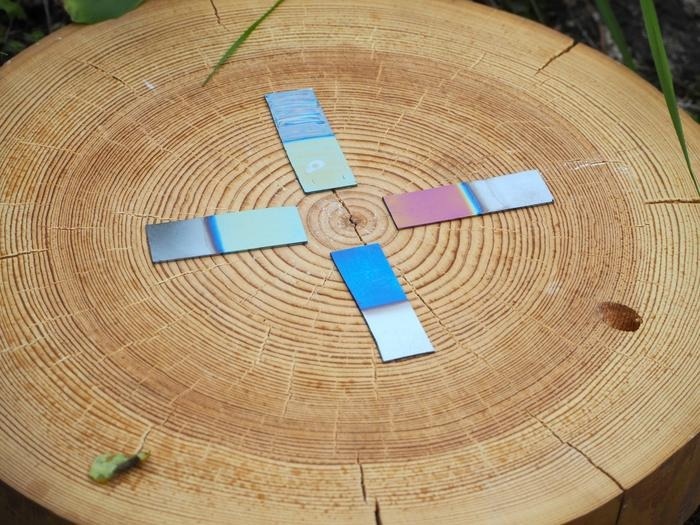Researchers have found a technique to transform scrap wood into a bio-based clear film that can be applied to s anti-fogging or anti-reflective coatings on glasses or vehicle windows. This method not only provides an alternative to the harmful synthetic materials now in use, but it also turns a waste product into a useful carbon sink.
 Films made of lignin nanoparticles can have structural coloration or be used as transparent anti-fog coatings. Image Credit: Alexander Henn / Aalto University
Films made of lignin nanoparticles can have structural coloration or be used as transparent anti-fog coatings. Image Credit: Alexander Henn / Aalto University
Due to its abundance and difficulty in processing, lignin is typically burnt to generate heat in the paper and pulp industry. Although the notion of producing lignin nanoparticles for anti-fogging coatings is not new, researchers have not yet succeeded in making them into transparent films.
Optical coatings need to be transparent, but so far, even rather thin lignin particle films have been visible. We knew that small particles appear less turbid, so I wanted to see if I could make invisible particle films by pushing the particle size to a minimum.
Alexander Henn, Study Lead Author and Doctoral Student, Aalto University
The researchers optimized the esterification process for acetylated lignin, which takes a few minutes and occurs at a relatively low temperature of 60 °C.
Henn added, “The lignin particles I made from the acetylated lignin had rather surprising properties, which made the rest of this study very interesting. The possibility to make photonic films, for example, came as a total surprise.”
The novel method can generate colored films from lignin nanoparticles in addition to anti-fogging and anti-reflective coatings. The researchers produced materials with various structural colors by adjusting the coating’s thickness and utilizing multi-layer films.
Henn stated, “Sahar Babaeipour’s efforts were key to controlling the particles’ photonic properties.”
He further stated that researchers Paula Nousiainen and Kristoffer Meinander offered knowledge in lignin chemistry and photonic phenomena, which aided the team in making sense of their findings and efficiently applying them.
According to the feasibility assessment, the reaction’s ease of use and high yield indicate that it might be profitably scaled up to industrial levels.
Lignin-based products could be commercially valuable and simultaneously act as carbon sinks, helping relieve the current fossil fuel-dependence and reduce carbon dioxide emissions. High value-added applications like this are important to drive lignin valorisation and move us away from using lignin only as a fuel.
Monika Österberg, Professor, Aalto University
According to Henn, the study benefited from having viewpoints that extended beyond the lab bench.
He added, “Teamwork was an important part of making this study impactful. We were able to include the techno-economic analysis with the help of Professor Pekka Oinas and doctoral researcher Susanna Forssell.”
The research was conducted as part of FinnCERES, the Academy of Finland’s flagship center for materials bioeconomy research, and was published in Chemical Engineering.
Journal Reference:
Henn, K. A., et al. (2023) Transparent lignin nanoparticles for superhydrophilic antifogging coatings and photonic films. Chemical Engineering. doi:10.1016/j.cej.2023.145965